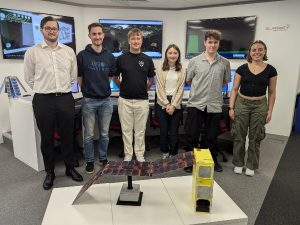The three universities are partners of the Space South Central regional space cluster, which is backed by the UK Space Agency. And their initiative is dubbed JUPITER – the Joint Universities Programme for In-Orbit Training, Education and Research.
The aim is for Jupiter to equip participants with valuable hands-on space industry experience and training for the benefit of future careers.
Satellite mission
The satellite mission – Jovian-1 – will feature a payload designed, built, tested and delivered by the students. It will take images and videos of the Earth and attempt to use a space-facing camera to look for space debris
There will also be a FUNcube, provided by AMSAT-UK. This is a communications payload which for enabling access to radio signals and data from the satellite using basic equipment. Specifically, it will provide a U/V FM voice transponder facility for amateurs to use for international communications.
It will also transmit telemetry, messages and mission data for educational outreach for schools and colleges, using the FUNcube data format, explained AMSAT-UK.
Experiments
Specific experiments by the universities will also be supported
For example, there will be elements of a future Dark Matter experiment that is being undertaken by the University of Southampton. It will represent a first step in demonstrating the suitability of their hardware and concept for use in space
A space radiation monitor from the University of Surrey will aim to better understand space weather and its effects on satellites.
And finally, an innovative Tiny Machine Learning payload represents work by the University of Portsmouth’s data-intensive research institute. This is the Institute of Cosmology and Gravitation, and it will work with the other payloads t demonstrate the use of AI with space data.
“This project is a great opportunity for students to get hands-on with real space engineering, allowing us to further develop skills from our degrees,” said University of Surrey PhD student, Ieuan Carney.
“As the student team lead, I’m already seeing progress in the students’ ability to not only identify potential design challenges, but also in how they’re improving their designs to overcome potential problems.”
Speaking on beahalf of the the University of Portsmouth, Dr Becky Canning, Deputy Director for Space, said:
“Our Universities are privileged to have a deep connection to our vibrant regional space sector and to have a strong heritage and partnership in space research, and it is a delight to be able to strengthen that partnership through this exciting project.”
“This ongoing partnership will offer an exceptional learning and outreach opportunity to our current and future students and to local schools, ensuring the sector continues to thrive.”
Finally, Professor Hendrik Ulbricht, who leads the University of Southampton’s involvement, said:
“This is a great opportunity for us to conduct a long-dreamed-of experiment in space.” We have the unique chance to do a fundamental physics experiment and directly test for low-mass Dark Matter in space with our levitated mechanical sensors, which are at an early stage of development and will aid our research in the future.”
Image: Some of the student team working on the JUPITER programme’s Jovian-1 project at the ground station in Surrey Space Centre, with a student-made, life-sized model of Jovian-1 in the foreground. L-R: Sam Gibson and Alejandro Parra Pintado (University of Southampton), Student Team Lead Ieuan Carney and Mae Parsons (University of Surrey), and Ross Wakelam and Sarah MacDonald (University of Portsmouth).
See also: University College London joins Space South Central

